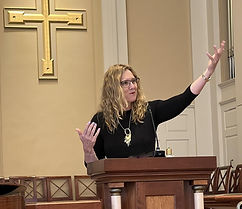Get in Touch
214-768-2027
Jaime Clark-Soles
Perkins School of Theology
PO Box 750133
Dallas, TX 75275
Fill out this form to inquire about Jaime’s availability. Please include as much information about your event as possible. We will be in touch with you soon!



"I’ve taken a few classes that I’ve liked but this was by far the one I enjoyed the most. The professor was super knowledgeable and yet easy to listen to and made the content very understandable. I can’t wait to get the slides and listen to it again! I learned a lot, and had some things confirmed that are a part of my deconstruction journey. Many thanks for this lesson!"
— Beth V.
"I really enjoyed this class. I thought I was at University in a classroom. She did an amazing job and I feel like I have a clearer understanding of the origins of the Protestant concept of hell. I also like the fact that she did not talk down to us. She assumed that we are intelligent people who really want to learn about a subject."
— Ruth J.
Keynote
Topics of Discussion
1
Gospel of John; 1-3 John
4
Experiencing God in the New Testament
7
Women in the Bible
2
Psychedelics, Faith, and Spirituality
5
Evil, Suffering, Death, and Afterlife
8
How We Got the New Testament (and rest of the Bible as well)
3
Paul with the Corinthians (1-2 Corinthians)
6
Disability and the Bible
9
The Nature of Scriptural Authority

"Great stuff. I loved how Dr. Clark-Soles wove together different concepts. I also liked how she didn't "get out over her skis" and stayed close to what the research can confidently support (and clearly stated the limits)."
— Kent S

"This class was excellent! I appreciated her knowledge and experience on the subject and learned so much. Interesting to discover that neither John nor Paul ever mentioned the term "hell". Thank you for keeping us informed and expanding our thinking."
Janette T.
